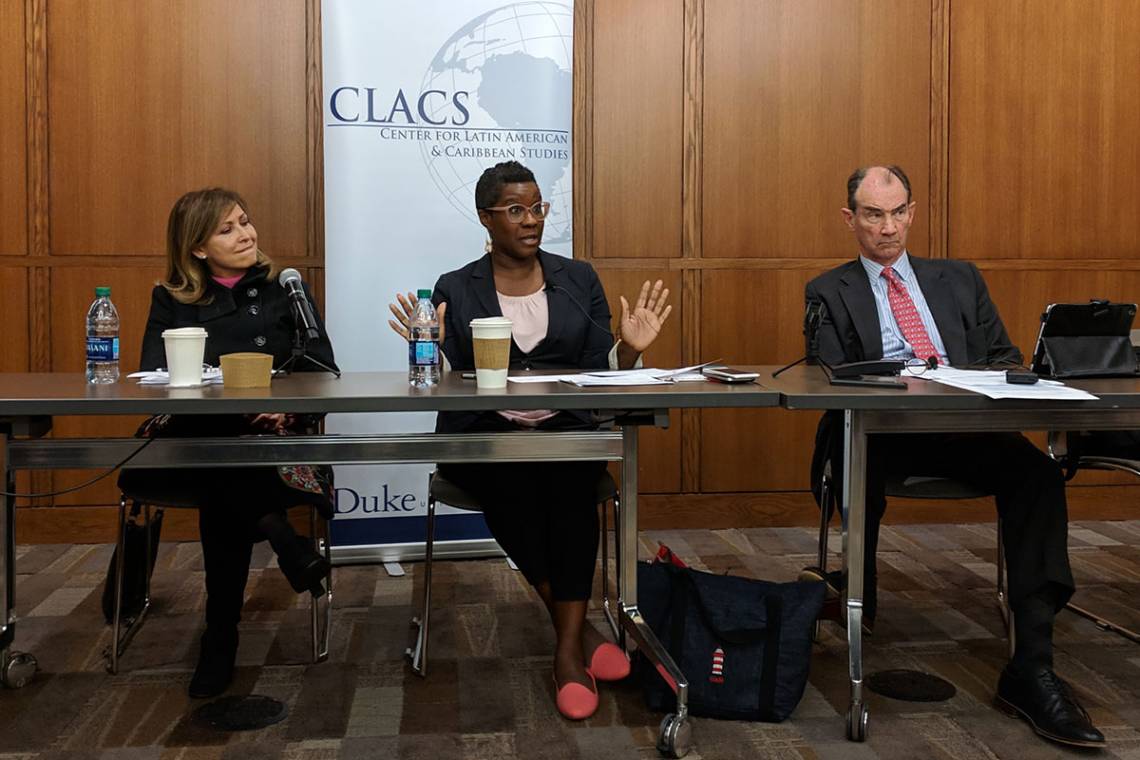Despite NAFTA Arguments, Regional Relationships Remain Strong

Despite the rancorous public talk over tariffs and NAFTA, the United States, Canada and Mexico enjoy relationships that are strong enough to transcend their leaders’ disagreements, trade officials said during a panel discussion at Duke.
That’s good news for North Carolina, where some 400,000 jobs depend on these relationships, said professor Patrick Duddy, a former ambassador to Venezuela who moderated Wednesday’s event.
“Canada is North Carolina’s No.1 customer and over 270,000 jobs depend on that trade-investment relationship,” said Nadia Theodore, Canada’s Atlanta-based consul general to the southeastern United States.
“North Carolina enjoys a trade surplus – you export more to Canada than we import to you. North Carolina sells more to Canada than it does to Mexico and China combined, and that kind of relationship, to me, is really a mirror to the broader U.S.-Canada relationship.”
In a June 13 op-ed in The News & Observer, Duddy cited these figures regarding how the state has benefitted from NAFTA:
- In 2017, North Carolina exported more than $6.5 billion in goods to Canada and around $3.5 billion in goods to Mexico;
- N.C. imported around $3.5 billion in goods from Canada and $4.7 billion from Mexico;
Both Theorore and Remedios Gómez Arnau, Raleigh-based consul general of Mexico, emphasized the importance of the 24-year-old NAFTA and its recently renegotiated version to the trade partnerships, called the United States-Mexico-Canada Agreement (USMCA).
“I think it has helped forge stronger ties between Mexico and the United States. That was the main thing at stake when renegotiating NAFTA,” Arnau said, adding that Mexico is the largest supplier of auto parts to the United States.
The three nations have until the end of November to sign the trade agreement (it then goes to the U.S. Congress). Both representatives said they expected passage.
“I don’t foresee great trouble there because we understand that NAFTA is very important as a framework … to maintain stability and certainty for our investors,” Arnau said.
Still unresolved outside of NAFTA are metal tariffs the Trump administration put in place, which angered both Canada and Mexico.
“Our position with regard to those tariffs is number one, they shouldn’t be in place,” Theodore said.
She said Trump’s argument that they were needed for national security reasons was “ridiculous” and “absurd,” listing the many occasions both sides conducted joint military operations.
They’re hopeful the U.S. will lift the tariffs when USMCA is signed.
“I think that they (Mexican officials) will be worried about the aluminum and steel tariffs. We expect they will be removed by when we sign it,” Gómez Arnau said.